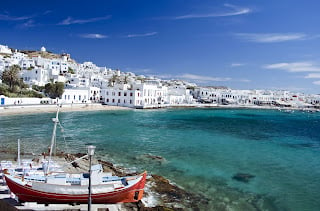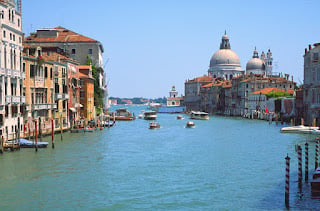
Do you dream of seeing the world and inspiring good along the way? That was the dream of Jessica Festa, the woman behind the travel blog Jessie on a Journey and the next guest we’ve invited to join us for our Travel Talk blog series.
Jessica has traveled all over the world to help people, including teaching English in Thailand and orphanage work in Ghana. She is also a backpacker by nature, and has backpacked through Europe and South America, studied abroad in Australia, and toured Southeast Asia and China.
She writes about her philanthropic travels on her blog to inspire others. We think Jessica is pretty inspiring herself! Read on for how she got started volunteering and traveling, misconceptions she often hears about solo women travelers, her best budget tip, and more.
1) When did your love of traveling begin?
I’ve been traveling my whole life, as my parents also are avid travelers, just with a different focus. When I was younger, we would do a road trip every summer driving to different amusement parks. Then as I got older, we started doing the whole cruise thing. It wasn’t until I studied abroad in Sydney, Australia, that I realized I wanted to go abroad more. Now my travel style is a mix of volunteering abroad, international solo backpacking, and U.S. road trips.
2) What is the most memorable destination you’ve visited and why?
Probably Sydney. I was there for six months and had an apartment, gym membership, favorite cafe, designated grocery store, a part-time job, etc. These things made me feel as though I was truly a local, and helped me to get to know the place. Another very memorable place was Ghana, Africa. I lived with a family and worked at an orphanage for a month, and really fell in love with the culture.
3) What’s the biggest misconception people have about traveling solo, especially women who travel by themselves?
That you can’t do it. People still tell me “you can’t go to Bolivia by yourself” or “Quito is too dangerous for a solo woman traveler.” Well, I’ve done both and lived to tell the tale!
4) What is the best piece of advice you can offer to someone traveling solo to a country they’ve never been to before?
Don’t give up as soon as you start to feel lonely. There will inevitably be times you feel a bit more lonely than others, but there are also ways to combat it. My favorite thing to do is use the CouchSurfing forum, not for sleeping on couches, but to plan meet-ups and dinners. For example, if you’re going to Buenos Aires, search for the city group, join, post a note saying when you’ll be in the city, and ask if anyone would be interested in grabbing a drink, sightseeing, etc. It worked out very well for me.
5) What’s one travel item you can’t leave home without?
My LUSH Godiva shampoo bar. It’s moisturizing, compact, and takes up much less space than a shampoo and conditioner together.
6) What’s your best budget travel tip?
Go local! Skip the touristy restaurants and shops and opt for local eateries and markets.
7) You’ve written in the past about a travel philosophy. How would you define yours?
To me, your travel philosophy is about your beliefs on travel and travel goals. It’s all about experiencing local culture and getting to know new people and places with an open and welcoming mind.
8) Are there any stereotypes of places you’ve visited that you can disprove based on your travels, especially for women travelers?
One thing I’ll say that’s usually wrong is when people stereotype an entire country. For example, I heard over and over about how dangerous Brazil was. However, while Rio and Sao Paulo may have been a bit rough, the areas of Paraty and Ilha Grande felt very, very safe.
9) When you meet other women solo travelers, have you found that there are any common personal or cultural characteristics that you share?
I think women solo travelers seem to be easy-going and adventurous. I mean, you have to be to go against the warnings of your friends and family and do what’s best for yourself.
10) Where in the world are you headed next?
I’m going on an adventure-focused trip to Ohio this week, which I’m excited about, as well as a two-week road trip from Melbourne to the Outback in Australia. Then, I’ll be driving around Kentucky for two weeks exploring the hiking and bourbon offerings. I definitely have some exciting things coming up! 🙂
Thanks for sharing your amazing adventures with us Jessica! Be sure to check out Jessie on a Journey for the latest news on where she’s going next.
 You probably have a lot of questions about your money when preparing for a trip abroad. Do you need traveler’s checks? Will you be able to find an ATM? Can you avoid pesky foreign transaction and other fees while enjoying some off-the-beaten-path destination?
You probably have a lot of questions about your money when preparing for a trip abroad. Do you need traveler’s checks? Will you be able to find an ATM? Can you avoid pesky foreign transaction and other fees while enjoying some off-the-beaten-path destination?










